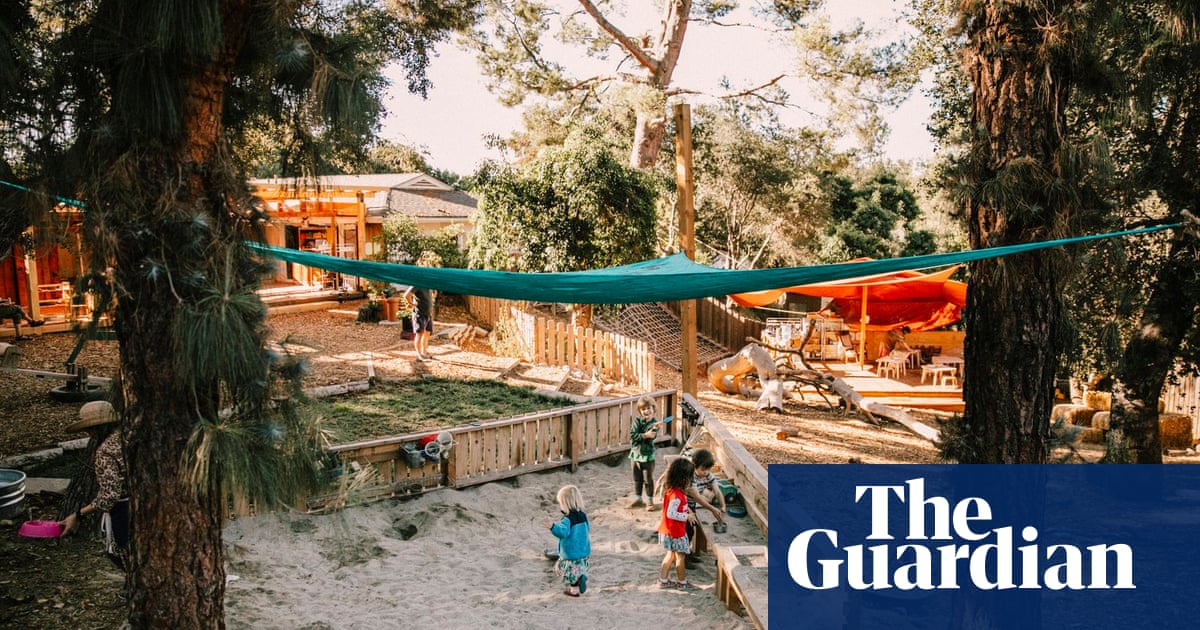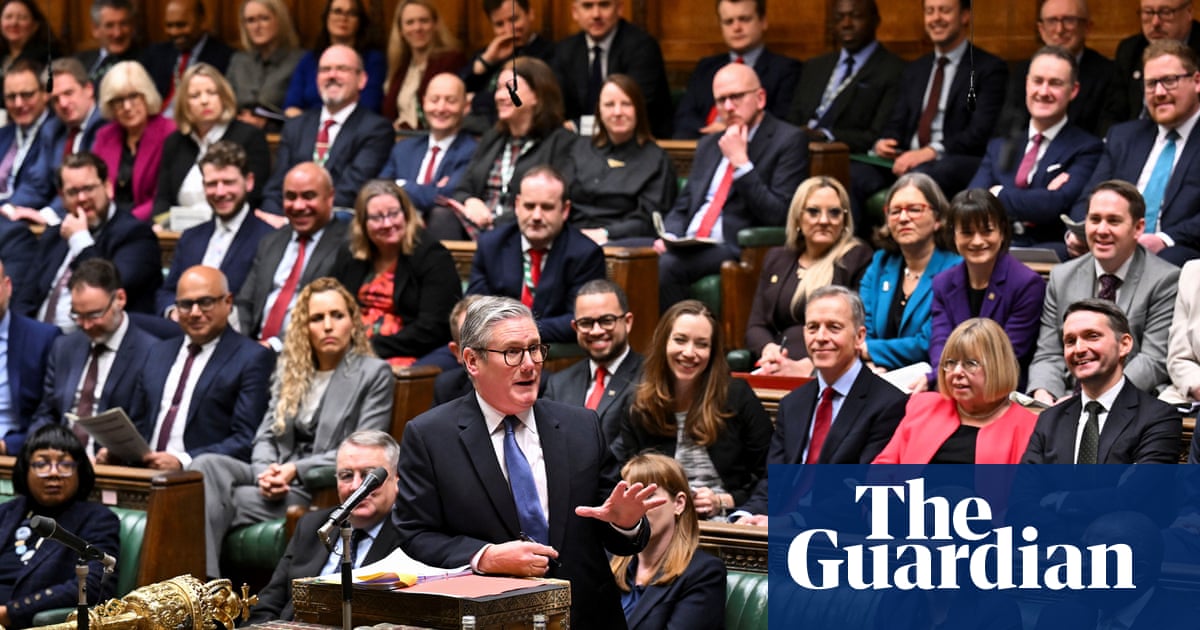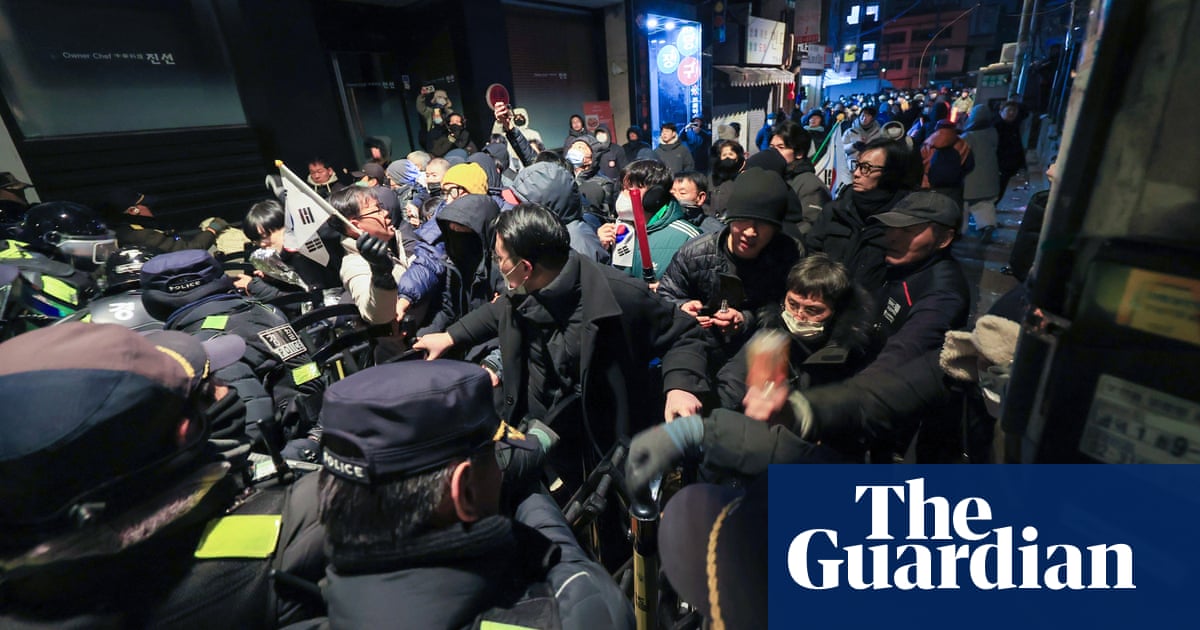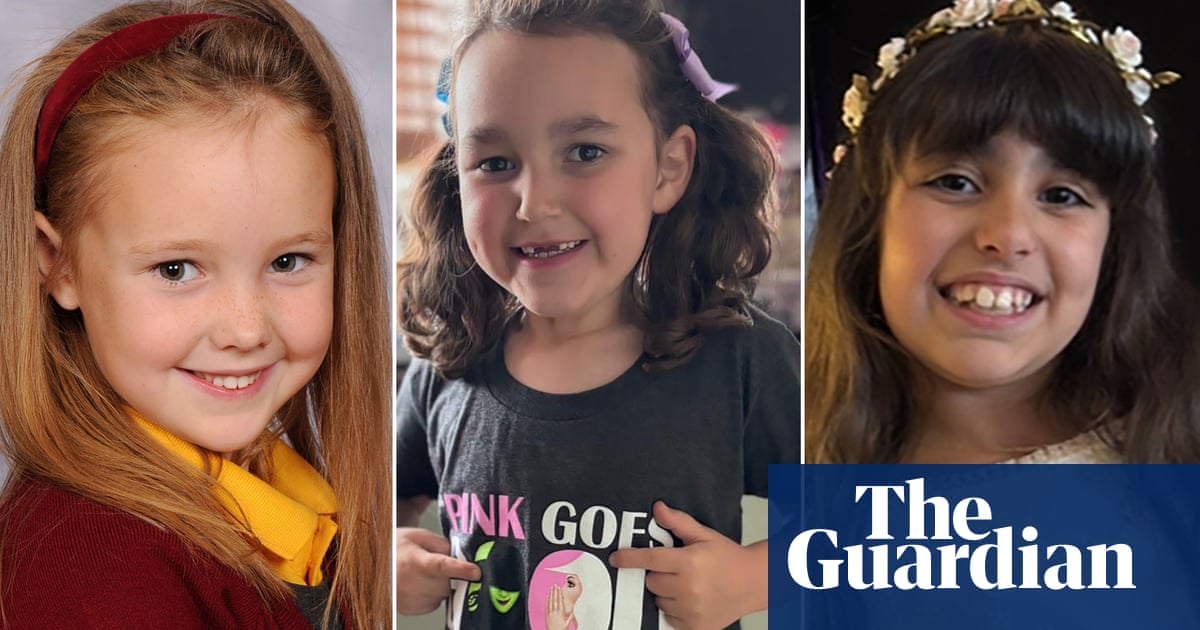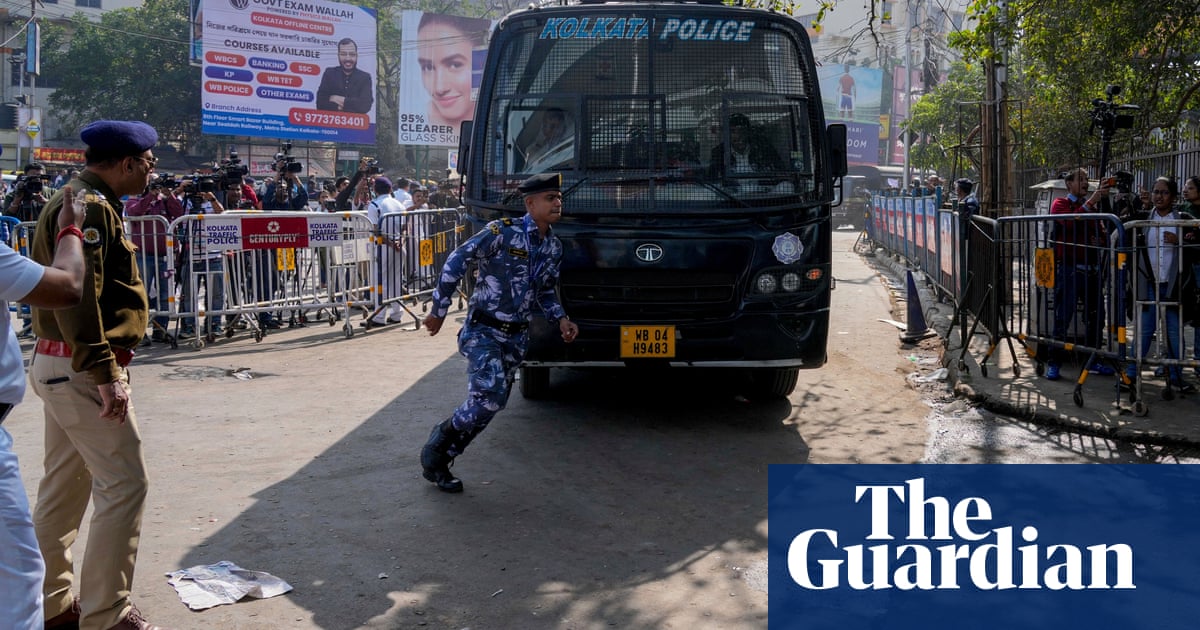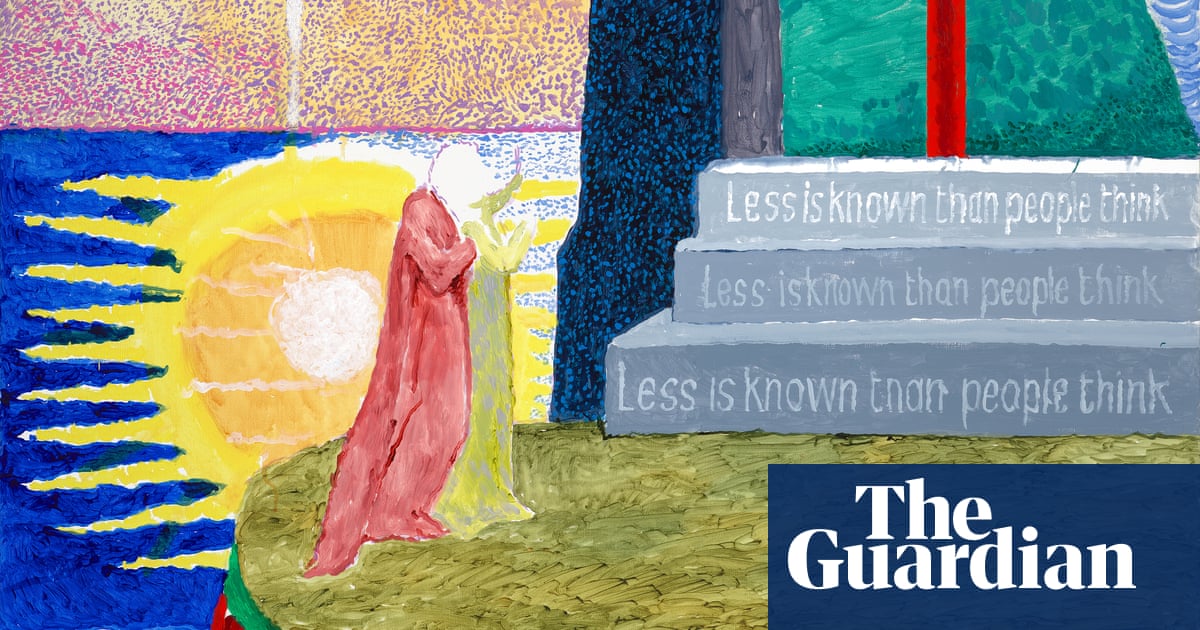Russian attack on central Kharkiv injures 23 people, governor says
We reported in an earlier post that officials said at least 10 people were injured in a Russian attack on Kharkiv this morning.
Kharkiv oblast governor Oleh Syniehubov has now said that 23 people were injured in the Russian shelling, which occurred about 8:30am in the central part of the Ukrainian city. He said 14 people were hospitalised. “Among them, five patients are in the surgical department, five are treated on an outpatient basis, two are referred for neurosurgical treatment. Two more people are being examined,” the governor wrote in a post on Telegram.

A police officer stands at a site of apartment buildings hit by a Russian missile strike in Kharkiv. Photograph: Vyacheslav Madiyevskyy/Reuters


Key events Show key events only Please turn on JavaScript to use this feature
Pro-Russia independent candidate wins first round of Romanian election

Jon Henley
Jon Henley is the Guardian’s Europe correspondent
An ultranationalist, Moscow-friendly Nato critic is set to face a centre-right candidate in the runoff of Romania’s presidential elections after a shock first-round result that has upended the country’s politics and could jeopardise its support for Ukraine.
With 99.98% of votes counted, Călin Georgescu, an independent who has praised Vladimir Putin as “a man who loves his country”, was on 22.9%, with the reformist Elena Lasconi, of the Save Romania Union (USR), second on 19.17%.
The result is one of the biggest electoral upsets in Romania’s post-communist history and bears little relation to pre-election polls, which had shown the little-known Georgescu running at 5% and predicted the outgoing prime minister, the centre-left, pro-EU Marcel Ciolacu, would win comfortably. Ciolacu instead was in third on 19.15%.

Romania’s president has a semi-executive role that includes significant decision-making powers over national security, foreign policy and judicial appointments. The runoff is scheduled for 8 December, after parliamentary elections due next Sunday.
The race is being watched well beyond Romania, which shares a 400-mile border with Ukraine and is seen by western allies as playing a key strategic role, hosting a Nato military base, donating a Patriot air defence battery and providing a vital transit route for millions of tonnes of Ukrainian grain.
Russia launched a missile attack against the central part of Odesa this morning, governor Oleh Kiper said.
“As of now, we recorded six injured. Five are in a condition of moderate severity, their lives are not in danger. One person is in serious condition,” said Oleksandr Kharlov, Kiper’s deputy, in a comment for the media.
“Civilian infrastructure was damaged, namely residential buildings,” Kiper said. Officials later said that the damage was caused by fallen missile debris.
Russia launched the strike into a densely populated residential area where there are no military targets, damaging a school and a university sports hall, Kharlov reported. No students were reported as injured, as they were hiding in shelters …
Odesa, lying on the Black Sea coast in southern Ukraine, is home to 1 million residents. The port city has been repeatedly targeted throughout the full-scale war.
An earlier missile attack on Odesa on Nov. 18 killed at least 10 people and injured over 50.
Russian attack on central Kharkiv injures 23 people, governor says
We reported in an earlier post that officials said at least 10 people were injured in a Russian attack on Kharkiv this morning.
Kharkiv oblast governor Oleh Syniehubov has now said that 23 people were injured in the Russian shelling, which occurred about 8:30am in the central part of the Ukrainian city. He said 14 people were hospitalised. “Among them, five patients are in the surgical department, five are treated on an outpatient basis, two are referred for neurosurgical treatment. Two more people are being examined,” the governor wrote in a post on Telegram.

A police officer stands at a site of apartment buildings hit by a Russian missile strike in Kharkiv. Photograph: Vyacheslav Madiyevskyy/Reuters


Nato allies will need to spend much closer to 3% of their gross domestic product (GDP) on their militaries to implement the alliance’s new defence plans, a Nato top military official has told Reuters (there is a Nato target for each member to spend 2% of economic output on defence).
The chair of Nato’s military committee, Rob Bauer, said:
The overall percentage that is necessary to make the new plans executable is much closer to 3% of GDP than it is to 2%.
I expect that under the new (Donald) Trump administration (in the US), there will be a much more intense discussion about how much more Europe and Canada need to spend, and that is a healthy and valid discussion to be had.
The Ukrainian military has claimed responsibility for the strike on an oil depot overnight in Russia’s western Kaluga region (see opening summary for more details). Vladislav Shapsha, the regional governor, said that there were no injuries and that three drones were destroyed. He did not say which facility was on fire. The Ukrainian military said it had also struck “a number of important targets” overnight in Russia’s Bryansk and Kursk regions, which are adjacent to Ukraine.
US president-elect Donald Trump has picked Republican representative Mike Waltz to be his national security adviser. After Russia invaded Ukraine two years ago, Waltz called for the Biden administration to provide more weapons to Kyiv to help them push back Moscow’s forces. But during an event last month, Waltz said there had to be a reassessment of the US’s aims in Ukraine.
“Is it in America’s interest, are we going to put in the time, the treasure, the resources that we need in the Pacific right now badly?” Waltz asked.
In an interview with Fox News on Sunday, which aired yesterday, Waltz said that Trump had been “very concerned” about an escalation in fighting between Russia and Ukraine and that the war must be brought “to a responsible end”.
“What we need to be discussing is who’s at that table, whether it’s an agreement, an armistice, how to get both sides to the table, and then what’s the framework of a deal,” Waltz said.
Kremlin spokesperson Dmitry Peskov said on Monday that the Kremlin had taken note of the comments and that Vladimir Putin had repeatedly signalled that Moscow was ready for dialogue over Ukraine.
“Indeed, from the circle of Trump supporters and those who have been nominated for future positions in the future administration, the word ‘peace’ or ‘peace plan’ is being heard,” Peskov said, when asked about Waltz’s comments. “No such words are being heard from the current (Biden) administration while provocative escalatory actions continue. That is the reality that we face,” he said.
Putin said Ukraine committing to drop its Nato membership ambitions and to hand over the entirety of four provinces claimed by Moscow are pre-conditions for peace talks. Ukraine says such terms would amount to an unacceptable capitulation for Kyiv.
Ukraine’s air force says it has shot down 71 out of 145 drones launched by Russia since Sunday evening, adding it had lost track of 71 more drones.
Who is the Briton who has reportedly been captured by Russian forces while fighting for Ukraine?
Here is a little more information on James Scott Rhys Anderson, the British national the Russian military have reportedly captured fighting alongside Ukrainian troops in Russia’s partially occupied Kursk region.
Tass, the Russian news agency, quoted him as saying that he had served as a signalman in the British army for four years and then joined the International Legion of Ukraine, formed early on in Russia’s full-scale invasion launched in February 2022.
In Ukraine, Anderson reportedly served as an instructor for Ukrainian troops and was deployed to the Kursk region against his will. Tass published a video of the man saying in English that he doesn’t want to be “here”. We have not yet been able to independently verify this information.
Speaking at the family home in Banbury, Oxfordshire, Anderson’s father, Scott, 41, told the Daily Mail that he fears his son will be tortured.

The father-of-four said:
I’m hoping he’ll be used as a bargaining chip but my son told me they torture their prisoners and I’m so frightened he’ll be tortured …
We spoke on WhatsApp almost every day until he went on his most recent operation. He was acting as a signalman.
James last came home only a month and a half ago. He said his Ukrainian commander had made a promise that he’d contact me if he was ever killed or captured.
When he called me and sent the video I was in complete shock and in tears. I could see straight away it was him. He looks frightened, scared and worried.
I didn’t want him to go. I did try to persuade him not to go – my whole family tried to persuade him. He wanted to go out there because he thought he was doing what was right. He was dead against what was happening to the Ukrainian people.
Since he went out earlier this year, he’s fallen in love with a Ukrainian although I don’t know her name.
I last spoke to him when I last saw him but we used to talk on WhatsApp every day. He’d tell me where he’d been and the things he’d seen.
He was alive, healthy. He sent me a video when he was at Sumy. Then he was being posted within the last week.
Russia plotting to use AI to enhance cyber-attacks against UK, minister will warn
Dan Sabbagh is the Guardian’s defence and security editor
Russia and other adversaries of the UK are trying to use artificial intelligence to enhance cyber-attacks against the nation’s infrastructure, the cabinet minister Pat McFadden will warn at a Nato conference in London on Monday.
The chancellor of the Duchy of Lancaster will announce the creation of a research programme in London, called the Laboratory for AI Security Research (LASR), to keep on top of emerging threats as he warns there is a risk that Russia will try to knock out the electricity grid.
There is a danger that artificial intelligence “could be weaponised against us,” McFadden will warn, arguing that the UK is already engaged in the “daily reality” of a “cyberwar,” with hacking efforts coming in particular from Russia.
Over the past year, Russia’s criminals and hackers have “stepped up their attacks” against the UK, he will add, and targeted other Nato allies who have been supporting Ukraine with military aid as it tries to fight off Russian aggression.
Russian attack on Kharkiv injures at least 10 people, officials say
Hello and welcome to the Guardian’s live coverage of Russia’s war on Ukraine.
A Russian attack on Ukraine’s northeastern city of Kharkiv injured at least 10 people on Monday morning, its mayor, Oleh Syniehubov, said. The attack reportedly caused a fire on one of the city’s central streets and damaged civilian infrastructure and cars.
There is also a report in the Ukrainian outlet Ukrinform that Russian drones damaged an infrastructure facility in Zaporizhzhia, where a 16-year-old girl was injured in an attack.
There was also a drone strike on Kyiv in the early hours of the morning, according to officials. There were no immediate report of casualties. “As a result of the attack by drones of the armed forces of the Russian Federation on Kyiv in the Dnipro district of the capital, a balcony window on the 9th floor of a 9-story residential building caught fire. Information about the victims is being ascertained,” Serhiy Popko, the head of the Kyiv city military administration, wrote on Telegram.
Elsewhere, Russian forces attacked energy infrastructure in Ukraine’s southern region of Mykolaiv overnight, its governor, Vitaliy Kim, said in a post on Telegram. The engineers restored power to most of the consumers facing affected by the power cuts in the attack’s aftermath as of the morning.

Here are some of the other latest developments in the war:
-
Volodymyr Zelenskyy has said he fears that Ukraine will become “a testing ground” for Russian munitions, with the country being targeted by nearly 500 drones in the past week, as well as more than 20 missiles. Though Russia’s first ever use of the Oreshnik intermediate range ballistic missile on Dnipro on Thursday captured global attention, on Sunday Zelenskyy highlighted the increased level of Shahed drone attacks. Ukraine says Russia has set up two factories to make the distinctive Iran-designed, delta-winged Shahed 136 drones, called Geran-2 by Moscow, about 800 miles from the border in Ukraine.
-
Seven Ukrainian missiles and seven drones were destroyed overnight over Russia’s Kursk, the governor of the region that borders Ukraine said. “Our air defence fighters repelled the attack of the Ukrainian Armed Forces last night,” Kursk regional governor Alexei Smirnov wrote on his Telegram channel. Ukraine launched a surprise incursion into the Kursk region in August, but has since lost more than 40% of the territory it had captured as Russian forces have mounted waves of counter-assaults, a senior Ukrainian military source told Reuters.
-
Falling debris from destroyed Ukrainian drones sparked a fire at an industrial facility in Russia’s Kaluga, officials said early on Monday. Vladislav Shapsha, the regional governor, said that there were no injuries and that three drones were destroyed. He did not say which facility was on fire.
-
A British national has reportedly been captured by Russia’s forces in the Kursk region while fighting for Ukraine. In a video posted on pro-war Russian Telegram channels on Sunday, a man wearing combat fatigues identifies himself as 22-year-old James Scott Rhys Anderson from the UK. The man, speaking with an English accent, says that he served as a signalman in the British army until 2023 before joining the International Legion in Ukraine to fight against Russia.

.png) 1 month ago
11
1 month ago
11






